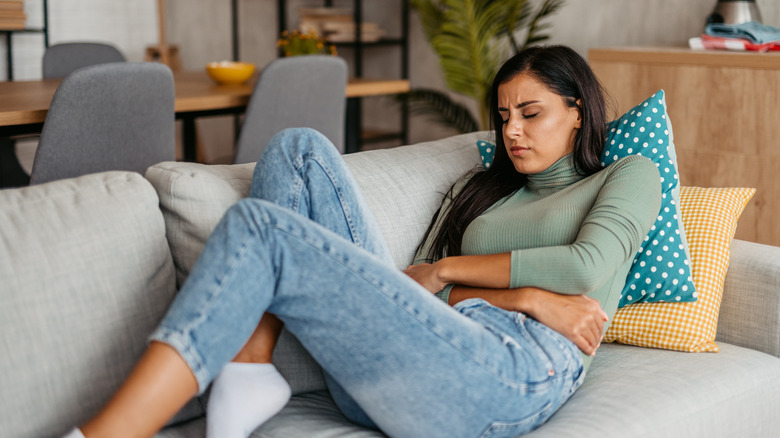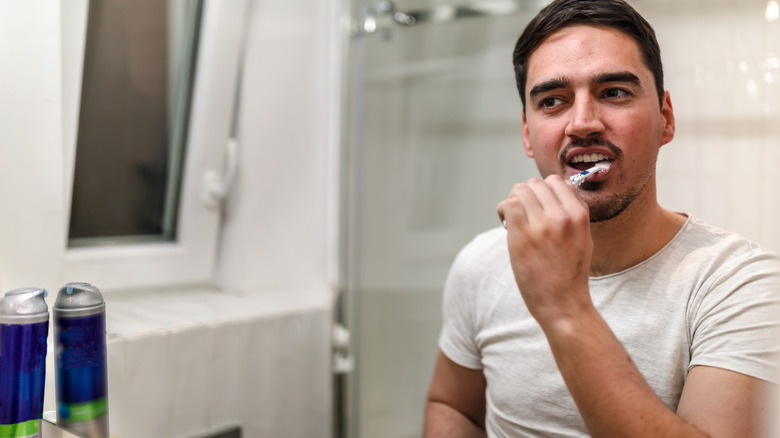Genius Water Tricks That Will Help You Avoid Stomach Bugs While Traveling
There are few things worse than getting sick while you're traveling. First, you're left to your own devices without all the comforts of home. Second, you might not speak the language very well — which means pharmacy trips are double the hassle. Third, there's the overwhelming feeling of guilt that you're missing out on all the adventures and experiences that you paid good money — and used up precious limited PTO — to enjoy.
Whether it's catching a cold on the plane ride there, dealing with headaches and shortness of breath from jetting off to a high-altitude city, or getting a heat rash after too much time in the sun, things can quickly go south during any holiday.
Then, there's the kingpin of all travel sickness: the stomach bug. Whether you ate something that's just not settling, drank contaminated water, or even came into contact with an infected person, stomach bugs have a notorious reputation for ruining vacations. In fact, according to the Centers for Disease Control and Prevention (CDC), between 30-70% of travelers are affected by the illness. It typically extends over a two-week period depending on where and when you choose to travel. Luckily, there are added steps you can take to ensure that a pesky stomach bug doesn't entirely derail your trip.
Watch what you eat and drink
The water you consume can either make or break your trip. Waterborne diseases are common in many parts of the world — especially in developing countries where access to clean drinking water is incredibly difficult. While your body might already be used to the water quality at home, it can easily react poorly somewhere else. All this goes to say: just don't drink the tap water. Always choose bottled water instead; and, if you want to be extra cautious, carry around water purification tablets.
Additionally, you'll also want to stay away from drinks that come with ice. While a cold drink might be tempting under the sweltering sun, ice cubes are frequently made from tap water that isn't safe for consumption. Instead, choose beverages that have either been bottled and sealed or boiled, like coffee or tea. This ensures that any harmful pathogens are kept at bay.
Then, apply the same principle to your food. Fresh foods — salads and fruits — are tempting, especially if they're something you've never seen before. However, these might have been washed in questionable water, meaning there's always a possibility that they might be contaminated. Unless you're certain that fresh foods were taken care of properly, it's best to avoid them. Instead, choose foods that have been thoroughly cooked — especially meats and grains — as the heat effectively neutralizes harmful bacteria. This means waving goodbye to the lukewarm buffet that's been sitting out all day, too.
Look after yourself
While the food you eat on holiday might feel out of your control, there are other steps you can take to make sure you're looking after your body. You know those constant reminders from our parents during childhood about the importance of washing our hands? They apply here, too. This means washing your hands for at least 20 seconds before sitting down to eat — and even keeping some hand sanitizer close by.
When it comes to being mindful of the water you use, extend that same caution into personal care. Because while drinking tap water can already feel like a gamble, using it to brush your teeth is just as risky.That said, keep bottled water handy in your hotel for things like brushing your teeth and face, and always ensure the cap is sealed when purchasing a new bottle. As for showers, while it's definitely impractical (and expensive) to use bottled water, be smart about keeping your mouth shut tightly and try not to ingest any shower water.
If you still happen to get sick — don't worry. Most stomach viruses tend to go away after a few days, which means you might still be able to enjoy your vacation after the fact. While no actual "cure" exists for these infections, over-the-counter solutions like Pepto Bismol, Advil, and Imodium can help manage symptoms. From there, it's also important to stay hydrated with the help of electrolyte-rich drinks to replenish lost fluids.


